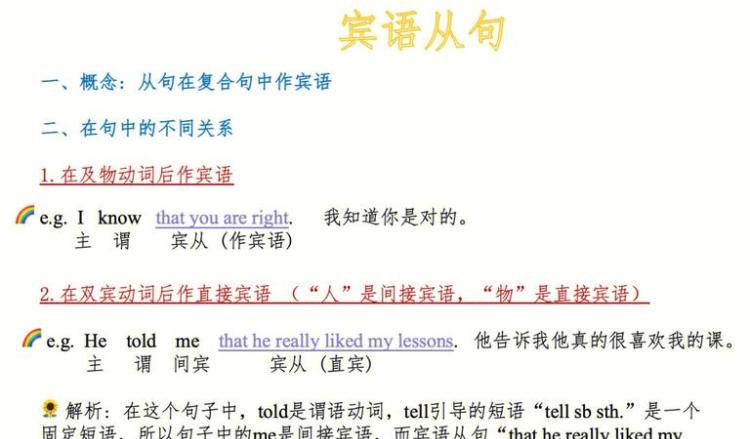宾语从句是英语语法中的重要用法,用于表达想法、意见、询问或确认事实、表达可能性或条件、表达原因等。它通常由连接词引导,如that、whether、if、when、where、why等,并放在主句的动词后面。在使用宾语从句时,需要注意选择合适的连接词和正确的语序。

什么是宾语从句?
宾语从句是一个句子,用来充当主句中的宾语。宾语从句通常放在主句的动词后面,例如:
- I know [that you are busy].
- She asked me [if I could help her].
- He wonders [whether it will rain tomorrow].
在上面的例子中,宾语从句用方括号括起来。
宾语从句的用法
宾语从句可以用来表达以下情况:
- 告诉别人自己的想法、意见或感受。 例如:I think [that we should go to the beach].
- 询问别人的想法、意见或感受。 例如:Do you know [if she is coming to the party]?
- 询问或确认事实。 例如:He asked me [when the meeting starts].
- 表达可能性或条件。 例如:I wonder [if he will come to the party].
- 表达原因或原因。 例如:I don’t understand [why he is so angry].
宾语从句的连接词
宾语从句的连接词有很多种,常见的有以下几种:
- that:用于表达陈述句的宾语从句。 例如:He said [that he would come to the party].
- whether/ if:用于表达选择疑问句的宾语从句。 例如:I’m not sure [whether/ if he will come to the party].
- when:用于表达时间状语从句。 例如:Can you tell me [when the train leaves]?
- where:用于表达地点状语从句。 例如:Do you know [where the party will be held]?
- why:用于表达原因状语从句。 例如:He didn’t explain [why he was late].
宾语从句的语序
在宾语从句中,句子的语序通常是主语+谓语(即陈述句的语序),而不是疑问句的语序。例如:
- I don’t know [what he is doing]。(而不是I don’t know what is he doing.)
- She asked me [if I could help her]。(而不是She asked me could I help her.)
